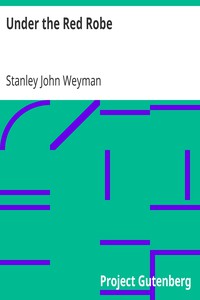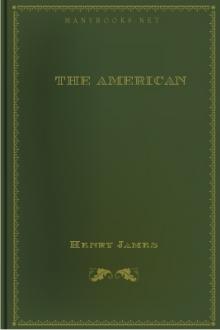Under the Red Robe by Stanley John Weyman (macos ebook reader TXT) 📗

- Author: Stanley John Weyman
Book online «Under the Red Robe by Stanley John Weyman (macos ebook reader TXT) 📗». Author Stanley John Weyman
But beggars must not be choosers, and I knew that this feeling would not last. At the inn, in the presence of others, under the spur of necessity, or in the excitement of the chase, were that once begun, I should lose the feeling. When a man is young he seeks solitude, when he is middle-aged, he flies it and his thoughts. I made therefore for the ‘Green Pillar,’ a little inn in the village street, to which I had been directed at Auch, and, thundering on the door with the knob of my riding switch, railed at the man for keeping me waiting.
Here and there at hovel doors in the street—which was a mean, poor place, not worthy of the name—men and women looked out at me suspiciously. But I affected to ignore them; and at last the host came. He was a fair-haired man, half-Basque, half-Frenchman, and had scanned me well, I was sure, through some window or peephole; for when he came out he betrayed no surprise at the sight of a well-dressed stranger—a portent in that out-of-the-way village—but eyed me with a kind of sullen reserve.
‘I can lie here to-night, I suppose?’ I said, dropping the reins on the sorrel’s neck. The horse hung its head.
‘I don’t know,’ he answered stupidly.
I pointed to the green bough which topped a post that stood opposite the door.
‘This is an inn, is it not?’ I said.
‘Yes,’ he answered slowly. ‘It is an inn. But—’
‘But you are full, or you are out of food, or your wife is ill, or something else is amiss,’ I answered peevishly. ‘All the same, I am going to lie here. So you must make the best of it, and your wife too—if you have one.’
He scratched his head, looking at me with an ugly glitter in his eyes. But he said nothing, and I dismounted.
‘Where can I stable my horse?’ I asked.
‘I’ll put it up,’ he answered sullenly, stepping forward and taking the reins in his hand.
‘Very well,’ I said. ‘But I go with you. A merciful man is merciful to his beast, and wherever I go I see my horse fed.’
‘It will be fed,’ he said shortly. And then he waited for me to go into the house. ‘The wife is in there,’ he continued, looking at me stubbornly.
‘IMPRIMIS—if you understand Latin, my friend,’ I answered, ‘the horse in the stall.’
He saw that it was no good, turned the sorrel slowly round, and began to lead it across the village street. There was a shed behind the inn, which I had already marked, and taken for the stable, I was surprised when I found that he was not going there, but I made no remark, and in a few minutes saw the horse made comfortable in a hovel which seemed to belong to a neighbour.
This done, the man led the way back to the inn, carrying my valise.
‘You have no other guests?’ I said, with a casual air. I knew that he was watching me closely.
‘No,’ he answered.
‘This is not much in the way to anywhere, I suppose?’
‘No.’
That was so evident, that I never saw a more retired place. The hanging woods, rising steeply to a great height, so shut the valley in that I was puzzled to think how a man could leave it save by the road I had come. The cottages, which were no more than mean, small huts, ran in a straggling double line, with many gaps—through fallen trees and ill-cleared meadows. Among them a noisy brook ran in and out, and the inhabitants—charcoal-burners, or swine-herds, or poor devils of the like class, were no better than their dwellings. I looked in vain for the Chateau. It was not to be seen, and I dared not ask for it.
The man led me into the common room of the tavern—a low-roofed, poor place, lacking a chimney or glazed windows, and grimy with smoke and use. The fire—a great half-burned tree—smouldered on a stone hearth, raised a foot from the floor. A huge black pot simmered over it, and beside one window lounged a country fellow talking with the goodwife. In the dusk I could not see his face, but I gave the woman a word, and sat down to wait for my supper.
She seemed more silent than the common run of her kind; but this might be because her husband was present. While she moved about getting my meal, he took his place against the door-post and fell to staring at me so persistently that I felt by no means at my ease. He was a tall, strong fellow, with a shaggy moustache and brown beard, cut in the mode Henri Quatre; and on the subject of that king—a safe one, I knew, with a Bearnais—and on that alone, I found it possible to make him talk. Even then there was a suspicious gleam in his eyes that bade me abstain from questions; so that as the darkness deepened behind him, and the firelight played more and more strongly on his features, and I thought of the leagues of woodland that lay between this remote valley and Auch, I recalled the Cardinal’s warning that if I failed in my attempt I should be little likely to trouble Paris again.
The lout by the window paid no attention to me; nor I to him, when I had once satisfied myself that he was really what he seemed to be. But by-and-by two or three men—rough, uncouth fellows—dropped in to reinforce the landlord, and they, too seemed to have no other business than to sit in silence looking at me, or now and again to exchange a word in a PATOIS of their own. By the time my supper was ready, the knaves numbered six in all; and, as they were armed to a man with huge Spanish knives, and made it clear that they resented my presence in their dull rustic fashion—every rustic is suspicious—I began to think that, unwittingly, I had put my head into a wasps’ nest.
Nevertheless, I ate and drank with apparent appetite; but little that passed within the circle of light cast by the smoky lamp escaped me. I watched the men’s looks and gestures at least as sharply as they watched mine; and all the time I was racking my wits for some mode of disarming their suspicions, or failing that, of learning something more of the position, which far exceeded in difficulty and danger anything that I had expected. The whole valley, it would seem, was on the look-out to protect my man!
I had purposely brought with me from Auch a couple of bottles of choice Armagnac; and these had





Comments (0)